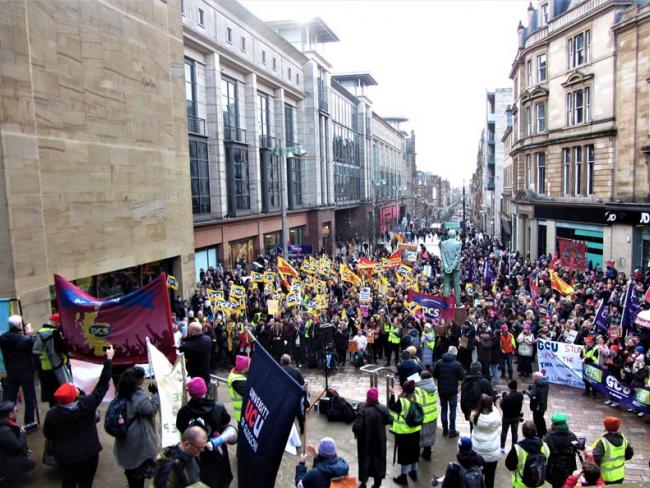
Trade union rally, Glasgow,February 2023. Photo Workers.
Workers have many questions. Will there be a war? How can Britain secure the energy we need? How much of our food can we grow here? What can be done to improve essential services? What jobs will my children have, and will they have somewhere decent to live? And many more, great and small.
These concerns unite workers across Britain, from Cornwall to Shetland, in cities towns and villages. They unite us, the vast majority, because we depend on our ability to work in order to live. And it’s our work which creates the value and wealth of the nation.
Those fundamental economic truths are what it means to be part of the working class. You can deny or ignore them, but that won’t change reality.
Berthold Brecht (1898-1956) wrote a poem which captures this, Questions From a Worker Who Reads; it opens:
Who built Thebes of the seven gates?
In the books you will read the names of kings.
Did the kings haul up the lumps of rock?
Workers don’t have control over the decisions that affect them and how their labour is used. They do not have control over which industries are closed and moved abroad and which stay for now, not over investment – and not over migration, which undermines wages and lets employers avoid training and skill development.
Capitalists, the ruling class, would have us believe that they are the source of wealth. And that workers are no more than an inconvenient necessity, to be dispensed with if at all possible. The great potential of technologies old and new, from electrical power to AI, is used to marginalise and undermine workers and not to enhance life.
Being part of the working class matters because it’s only through action together, acting as a class in our common interest, that we can begin to answer those questions.
Workers’ experience should tell us that parliament – along with all the devolved assemblies, councils, mayors and so on – is not the answer, no matter who you vote for.
Governments are not truly in control of the economy either. They simply seek to manage it for finance capital. How else do you explain polices like mass migration, net zero and the sale of key industries to foreign owners? And above all now, the drive to war.
An emphasis on industry and production, on building and developing them in Britain, has the potential to unite the working class. This isn’t a nostalgic wish to return to the past. To deny the need to make goods, grow food and so on is denying reality. As is the thought that we cannot or should not do so here in Britain.
The idea that workers are only those who use their hands, and they need to be told what to do is false. It is perpetuated by the ruling class and those who serve them – and it mirrors what slaveowners thought about their slaves in the past.
The truth is that all workers live by hand and brain – whether stonemasons in ancient Egypt or Rolls-Royce aerospace engineers. All workers act and think, at work and outside it. We can’t change the reality of being working class, but we can embrace it and think about how to change the world, starting with Britain. Brecht titled that poem as he did for good reason.
And shortly after World War Two, Brecht also wrote about nationalism in his native Germany. In response to corruption by the Nazis of the poem which became their national anthem, he wrote his own. It ends:
And because we’ll make it better
let us guard and love our home
Love it as our dearest country
as the others love their own.
Calling for a revival of industry, production and services in Britain isn’t calling for the impossible. In the end there is no choice but to do that. The government and the ruling class may take the working class for fools, but we don’t have to believe them.
No to war! Rebuild Britain!
